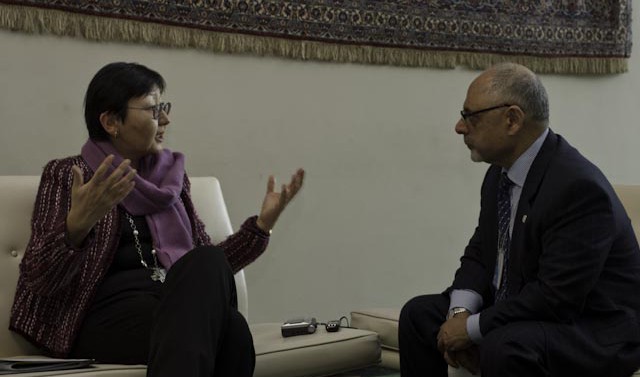MediaGlobal News Bureau Chief Nosh Nalavala in conversation with Enkhtsetseg Ochir, Ambassador and Permanent Representative of Mongolia to the United Nations
NOSH NALAVALA: When was the Think Tank established in Mongolia for the LLDCs?
ENKHTSETSEG OCHIR: In 2006 it was proposed that a Think Tank would be devoted to building the capacity of LLDCs and in providing research on issues. When the UN Secretary-General came to visit Mongolia in 2009, we launched it. The multi-lateral agreement itself was adopted in September 2010 by the foreign ministers of landlocked developing countries, and it was open for signatures and ratification by these countries. Since then we have seven signatures.
Will all the LLDCs participate in it?
It is a process that has just started. In the future all the LLDCs will accede to the agreement. We are still in the process of putting the think tank into operation.
What is the purpose of setting up the think tank and what will it accomplish, eventually?
Most of the LLDCs are small countries with limited capacity, limited human resources to actively participate in multi-lateral negotiations. The idea was to equip the diplomats, the representatives with top-notch research and justification that would help with the multi, bi and tri-lateral negotiations without limiting the decision-making approach.
In 2009 the UN Secretary General talked about analytical capacity of LLDCs. What did the Secretary General mean by “analytical capacity”?
I believe he meant it to be like other Think Tanks, ‘analytical’ meaning, based on the elements and research, to have an analysis of what’s happened — for example for countries like Mongolia, we have been holding negotiations with our (including bi and tri-lateral) neighbours, on private transportation. Private transportation costs are enormous, from 7 to 9 percent of our budget.
Is it because of being landlocked?
Yes, because of being landlocked, (as well as) because of transit either through Russia or China. So private transportation costs are enormous. We need to ease the burden and put those resources to better use, for public ratification, for health, for education purposes. So we have been holding these trilateral negotiations with both our neighbours.
When your president was at the General Assembly, he mentioned the Think Tank helped Mongolia reach the Millennium Development Goals. Could you please elaborate on that . . .
The ultimate focus is to help the efforts of LLDCs achieve the Millennium Development Goals by 2015, plus resolving human development, human mortality, maternal mortality, child mortality, health issues.
How is Mongolia doing with the MDGs?
We are working on that — the latest report by the government has the evaluation that we have 66 percent of our MDGs on track and it could be achieved by 2015.
How has climate change affected Mongolia and what are you doing about it?
Climate change has impacted Mongolia immensely – if you take the average temperature warming, our researchers conclude that in the last 60 years, the temperature warming has occurred twice faster than average on the global level. Also all the lakes are disappearing.
Do you have an issue with deforestation also?
Yes, both the government and states are taking measures to stop (this). There is a law in Mongolia — legislation to include environmental rehabilitation.



